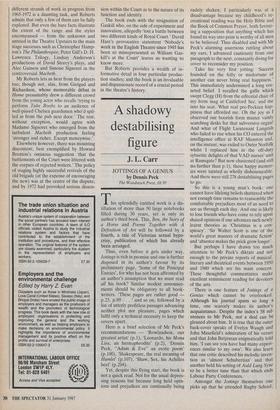A shadowy destabilising figure
J. L. Carr
JOTTINGS OF A GENIUS by Dennis Peck
The Woodstock Press, f6.95
This splendidly entitled work is a dis- tillation of more than 50 large notebooks filled during 30 years, yet is only its author's third book. This, Ben, the Story of a Horse and Poems Together with A Definition of Art will be followed by a fourth, a tale of Victorian sexual hypo- crisy, publication of which has already been arranged.
Thus, even before it gets under way, Jottings is rich in promise and one is further disposed in its author's favour by its preliminary page, 'Some of the Principal Entries', for who has not been affronted by an author's assumption 'that we must read all his book? Similar modest announce- ments should be obligatory to all book- writers. 'These pages are rather good p.23, p.89 . . . ' and so on, followed by a list of utterly profitless passages advancing neither plot nor pleasure, pages which fulfil only a technical necessity to keep the covers apart.
Here is a brief selection of Mr Peck's recommendations — `Rowlandson, our greatest artist' (p.1), 'Leonardo, his Mona Lisa, an hermaphrodite' (p.2), 'Dennis Peck, "Adam & Eve" an erotic poem' (p.100), 'Shakespeare, the real meaning of Hamlet' (p.107), 'Shaw, Sex, his Achilles heel' (p.204).
Yet, despite this flying start, the book is not a quick read. Not for the usual depres- sing reasons but because long held opin- ions and prejudices are continually being rudely shaken. I particularly was at a disadvantage because my childhood's re- creational reading was the Holy Bible and the Book of Common Prayer, both favour- ing a supposition that anything which has found its way into print is worthy of all men to be believed. Thus disabled and with Mr Peck's alarming assertions rattling about my ears, I advanced cautiously from one paragraph to the next, constantly diving for cover to reconsider my position. Take his very first jotting: 'Success founded on the folly or misfortune of another can never bring real happiness.' This immediately undermined a long cos- seted belief. I recalled the gaffe which swept Clegg (H) from the editorial chair of my form mag at Castleford Sec. and me into his seat. What real pre-Peckian hap- piness that afforded me. Oh the joy as I observed our boorish form master vainly searching desks for that subversive organ! And what of Flight Lieutenant Langrish who failed to rise when his CO entered the intelligence office at RAF Manston and, on the instant, was exiled to Outer Norfolk whilst I replaced him in the off-duty sybaritic delights of that VAD nurses' unit at Ramsgate? But now chastened (and still no further than p.1), these happy memor- ies were tainted as wholly dishonourable. And there were still 278 destabilising pages to go.
So this is a young man's book: one cannot have lifelong beliefs shattered when not enough time remains to reassemble the comfortable prejudices most of us need to see us through each day. And one is likely to lose friends who have come to rely upon shared opinions if one advances such newly learnt theories as 'Christmas is a con- spiracy', 'Sir Walter Scott is one of the world's great masters of dramatic fiction' and 'absence makes the prick grow longer'.
But perhaps I have drawn too much attention to Mr Peck's diktats and not enough to the private reports of musical, literary and theatrical events between 1950 and 1980 which are his main concern. These thoughtful commentaries make excellent reminiscent reading for devotees of the arts.
There is one feature of Jottings of a Genius which cannot be overlooked. Although his journal spans so long a time, one scarcely makes its author's acquaintance. Despite the index's 58 ref- erences to Mr Peck, not a deal can be gleaned about him. It is true that the outer back-cover speaks of Evelyn Waugh and John Masefield's admiration of his verses and that John Betjeman enigmatically told him, 'I can see you have had many experi- ences similar to my own'. We also learn that one critic described his melodic inven- tion as 'almost Schubertian' and that another held his setting of Auld Lang Syne to be a better tune than that which ends Labour Party Conferences. Amongst the Jottings themselves one picks up that he attended Rugby School, spent a time in Worthing learning the printing trade, has performed in chilly chapels on Edinburgh's fringe and has a wife (p.187). But not much else. He seems to live in a world of words.
So he remains a shadowy figure, a man with boundless enthusiasm for the arts and (so it seems to me) a talented travel-writer, a literary gent stranded like some beached whale on a friendless shore. And, by and large, he does not lament this. Dismounted from his hobby-horses, he can endure such misfortune as one train reaching Didcot railway station too late and another leaving too early with equanimity. Only literary editors over-excite him and such wasteful excess of emotion he must seek to subdue. For (as is well known) they are the most elusive of targets, endowed with a chameleon-like ability to disappear into any controversial landscape, leaving behind an already fading regretful smile.




































 Previous page
Previous page